April 2025

Senior Research Analyst

Reviewed By
The hydrogen vehicle market is set to grow from USD 3.46 billion in 2025 to USD 21.65 billion by 2034, with an expected CAGR of 22.61% over the forecast period from 2025 to 2034.
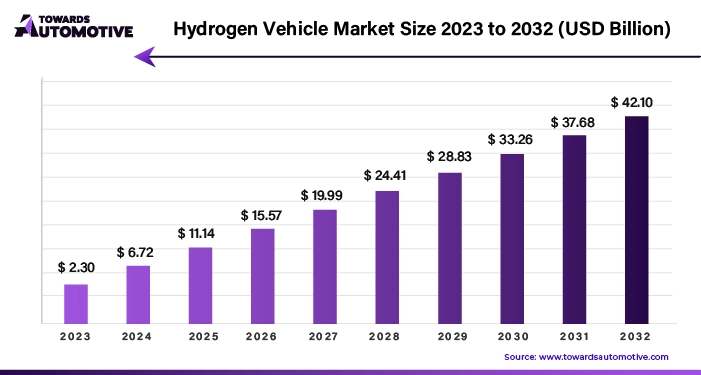
Government support and regulations are pivotal in fostering the growth of hydrogen vehicles, which represent a promising solution for reducing greenhouse gas emissions and combating climate change. To incentivize the adoption of hydrogen vehicles, governments worldwide provide financial support and incentives such as tax credits, subsidies, rebates, and direct payments. These measures aim to alleviate the upfront costs associated with purchasing hydrogen vehicles or operating them, making them more affordable and attractive to consumers.
Public awareness of environmental issues, particularly the urgency of addressing climate change and air pollution, is also driving interest in hydrogen vehicles. As people become increasingly conscious of their carbon footprint and the detrimental effects of air pollution on health, they are seeking sustainable transportation alternatives. Hydrogen vehicles have the potential to significantly reduce greenhouse gas emissions and contribute to cleaner air quality, aligning with public concerns about environmental sustainability.
However, challenges remain in the widespread adoption of hydrogen vehicles. The technology required for producing hydrogen, such as electrolysis or steam methane reforming, is still in development and requires significant investment. Additionally, the infrastructure for hydrogen refueling stations is limited, posing a barrier to widespread adoption. Moreover, the manufacturing process for hydrogen fuel cells, a key component of hydrogen vehicles, involves complex engineering and expensive materials, contributing to the high cost of hydrogen vehicles compared to conventional vehicles.
Despite these challenges, ongoing advancements in technology, infrastructure development, and government support are expected to drive the growth of the hydrogen vehicle market. As economies of scale are achieved and technology matures, the cost of hydrogen vehicles is anticipated to decrease, making them more competitive in the automotive market and accelerating their adoption as a sustainable transportation solution.
The hydrogen automobile industry has indeed felt the reverberations of the COVID-19 pandemic. The widespread disruptions caused by the pandemic, including lockdowns, production halts, and supply chain bottlenecks, have significantly impacted the hydrogen vehicle sector. With restrictions imposed on manufacturing facilities and logistical operations, the production of hydrogen vehicles has been hampered, leading to delays in delivery and deployment.
Moreover, the economic downturn resulting from the pandemic has cast a shadow over investment in hydrogen infrastructure. With businesses facing financial uncertainties and governments reallocating resources to address immediate health and economic concerns, the pace of investment in hydrogen refueling stations and related infrastructure projects has slowed down. This slowdown has further hindered the expansion of the hydrogen vehicle market.
Furthermore, reduced consumer spending and travel restrictions have dampened the demand for automobiles across the board, including hydrogen vehicles. As individuals and businesses tightened their budgets and curtailed discretionary spending, the adoption of hydrogen vehicles, which often come with a premium price tag, has been adversely affected. The uncertainty surrounding future economic conditions and job stability has also contributed to a cautious approach among consumers, impacting their willingness to invest in new vehicles, including hydrogen-powered ones.
Overall, while the COVID-19 pandemic has presented significant challenges to the hydrogen automobile industry, there remains optimism for its long-term prospects. As economies recover and governments prioritize sustainable transportation solutions in their post-pandemic recovery plans, the momentum for hydrogen vehicles may regain traction. Additionally, ongoing advancements in technology and continued efforts to address infrastructure challenges will be key in driving the resurgence of the hydrogen automobile sector in the coming years.
The hydrogen vehicle industry has indeed garnered substantial investment from various stakeholders, including automakers, technology firms, and governmental bodies. This influx of investment capital is catalyzing intensive research and development efforts aimed at advancing hydrogen vehicle technology, enhancing infrastructure, and expanding hydrogen production and distribution networks.
Automakers, recognizing the potential of hydrogen fuel cell technology to address environmental concerns and meet increasingly stringent emissions regulations, are committing significant resources to the development of hydrogen-powered vehicles. These efforts include designing and manufacturing hydrogen fuel cell vehicles (FCVs) with improved performance, efficiency, and affordability. Moreover, collaboration among automakers and technology companies is fostering innovation and accelerating the commercialization of hydrogen vehicles.
In parallel, governments around the world are actively supporting the hydrogen vehicle industry through policy initiatives, financial incentives, and regulatory frameworks. By providing subsidies, grants, tax credits, and other forms of financial assistance, governments are incentivizing investment in hydrogen infrastructure, including hydrogen refueling stations and hydrogen production facilities. Additionally, regulatory measures such as emissions standards and vehicle procurement mandates are further driving the adoption of hydrogen vehicles.
To complement these efforts, industry stakeholders are engaging in public outreach and awareness campaigns to promote the benefits of hydrogen-fueled vehicles. By disseminating information about the environmental advantages, performance capabilities, and long-term sustainability of hydrogen vehicles, these initiatives aim to build consumer confidence and stimulate demand. Word-of-mouth campaigns, educational events, and demonstration projects are among the strategies employed to raise awareness and generate interest in hydrogen-powered transportation.
The concerted efforts of automakers, technology companies, governments, and other stakeholders are propelling the growth of the hydrogen vehicle industry. Through strategic investments, collaborative partnerships, and public engagement initiatives, the industry is poised to play a significant role in the transition to a more sustainable and low-carbon transportation ecosystem.
The segmentation of the hydrogen vehicle market into fuel cell electric vehicles (FCEVs) and hybrid vehicles reflects the industry's response to increasing concerns about air quality and noise pollution from traditional internal combustion engine vehicles. FCEVs, in particular, are gaining traction as a viable alternative due to their zero-emission operation and reduced environmental impact.
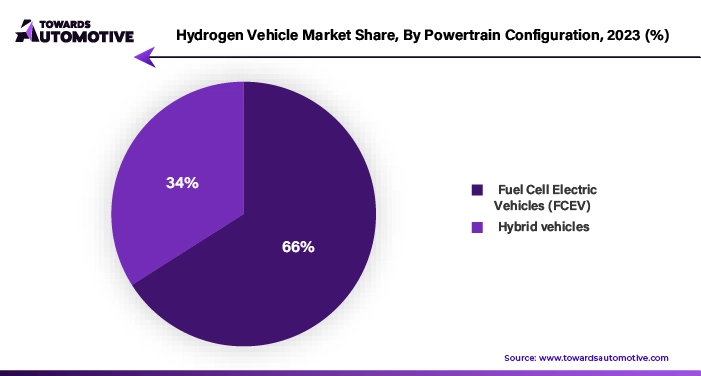
One of the primary drivers of growth in the FCEV segment is the growing awareness of the detrimental effects of air pollution on public health and the environment. As urbanization and industrialization continue to expand globally, the need for cleaner transportation solutions becomes increasingly urgent. FCEVs offer a promising pathway to address these concerns by emitting only water vapor as a byproduct of their operation, thereby significantly reducing harmful emissions.
The rapid transition from gasoline-powered vehicles to cleaner alternatives reflects shifting consumer preferences towards environmentally friendly transportation options. As individuals and businesses alike prioritize sustainability and eco-consciousness, there is a growing demand for vehicles that minimize their carbon footprint and contribute to mitigating climate change. FCEVs, with their efficient utilization of hydrogen fuel and absence of tailpipe emissions, are well-positioned to meet this demand.
Government initiatives and policies also play a crucial role in driving the growth of the hydrogen vehicle market. Strict environmental regulations, coupled with government subsidies and incentives aimed at promoting the adoption of clean fuels and technologies, provide a favorable regulatory environment for FCEVs. These measures encourage investment in hydrogen infrastructure, research and development, and consumer adoption of hydrogen vehicles.
Concerns about increasing emissions from conventional gasoline and diesel vehicles further underscore the need for alternative powertrain technologies like FCEVs. As urban areas grapple with worsening air quality and the adverse effects of vehicular pollution on public health, the transition to zero-emission vehicles becomes imperative. FCEVs offer a sustainable solution to these challenges, providing a pathway towards cleaner, greener transportation systems.
The growth of the hydrogen vehicle market, particularly the FCEV segment, is driven by a combination of factors, including increased awareness of environmental issues, shifting consumer preferences, supportive government policies, and the need to reduce emissions from traditional vehicles. As these trends continue to evolve, FCEVs are poised to play a pivotal role in shaping the future of sustainable transportation.
The segmentation of the hydrogen vehicle market into passenger cars and commercial vehicles reflects the diverse applications and potential impact of hydrogen-powered transportation across different sectors.
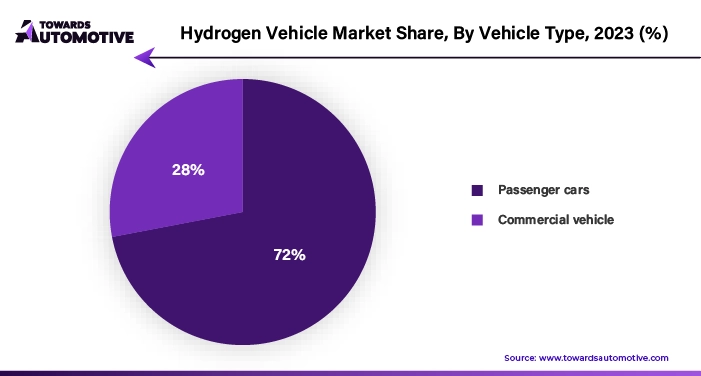
The growth of hydrogen-powered passenger cars is driven by several key factors. First and foremost, growing environmental concerns and the need to mitigate climate change have spurred interest in zero-emission vehicles. Hydrogen-powered passenger cars offer an environmentally friendly alternative to traditional gasoline and diesel vehicles, as they produce only water vapor as a byproduct of their operation. This zero-emission capability aligns with global efforts to reduce greenhouse gas emissions and combat air pollution, making hydrogen-powered passenger cars an attractive option for eco-conscious consumers.
Advancements in hydrogen fuel cell technology and infrastructure development have expanded the feasibility and appeal of hydrogen-powered passenger cars. Manufacturers are investing in research and development to improve the performance, range, and affordability of hydrogen fuel cell vehicles, making them more competitive with conventional vehicles in terms of driving experience and convenience. Additionally, the establishment of hydrogen refueling stations and infrastructure networks is enhancing the accessibility and convenience of hydrogen-powered passenger cars, addressing one of the key barriers to adoption.
Government support and incentives also play a critical role in driving the growth of hydrogen-powered passenger cars. Governments around the world are implementing policies, subsidies, and incentives to promote the adoption of zero-emission vehicles, including hydrogen-powered passenger cars. These measures include tax incentives, rebates, grants, and subsidies for vehicle purchases, as well as funding for hydrogen infrastructure development. By incentivizing consumers and manufacturers to embrace hydrogen technology, governments aim to accelerate the transition to sustainable transportation and reduce reliance on fossil fuels.
Pilot projects, demonstrations, and collaboration between various stakeholders in the hydrogen ecosystem are driving innovation and fostering market growth. Partnerships between automakers, technology companies, energy providers, and government agencies are facilitating research, development, and deployment of hydrogen-powered passenger cars, contributing to the expansion of the market.
The growth of hydrogen-powered passenger cars is fueled by environmental concerns, technological advancements, infrastructure development, government support, and collaborative efforts across the industry. As these trends continue to evolve, hydrogen-powered passenger cars are poised to play a significant role in the transition to sustainable transportation and the reduction of emissions in the automotive sector.
The leadership of North America in the global hydrogen vehicle market presents an opportunity for international collaboration and knowledge exchange to drive further market growth. By sharing best practices, research findings, and technological advancements, countries within the region can collectively accelerate the adoption and development of hydrogen transportation solutions.
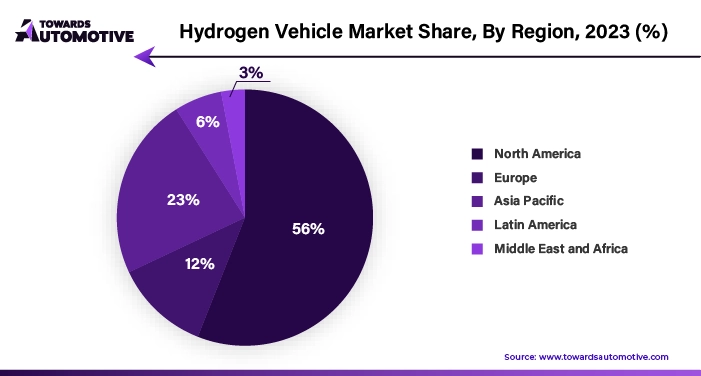
In North America, promoting cooperation and collaboration among government agencies, industry partners, and research institutions is essential to unlocking the full potential of hydrogen vehicles. By working together, stakeholders can leverage their expertise, share resources, and foster innovation to overcome challenges and drive significant business growth.
Government agencies play a crucial role in facilitating collaboration and providing support for hydrogen vehicle initiatives. By implementing supportive policies, regulations, and incentives, governments can create an enabling environment for industry stakeholders to invest in hydrogen infrastructure and technology development. Additionally, government-led research and funding programs can spur innovation and accelerate the commercialization of hydrogen vehicles.
Industry partners, including automakers, technology companies, and energy providers, can collaborate on joint research projects, pilot programs, and demonstration projects to validate the feasibility and viability of hydrogen transportation solutions. By pooling resources and expertise, industry stakeholders can address technical challenges, optimize supply chains, and scale up production to meet growing demand for hydrogen vehicles.
Research institutions and academic organizations play a critical role in advancing hydrogen vehicle technology through fundamental research, applied research, and knowledge dissemination. Collaborative research initiatives and partnerships between academia and industry can drive innovation, develop new technologies, and train the next generation of hydrogen vehicle experts.
Promoting collaboration and cooperation across government, industry, and academia in North America will foster a conducive environment for the growth of the hydrogen vehicle market. By working together towards common goals, stakeholders can unlock the full potential of hydrogen transportation and drive sustainable economic growth while reducing emissions and dependence on fossil fuels.
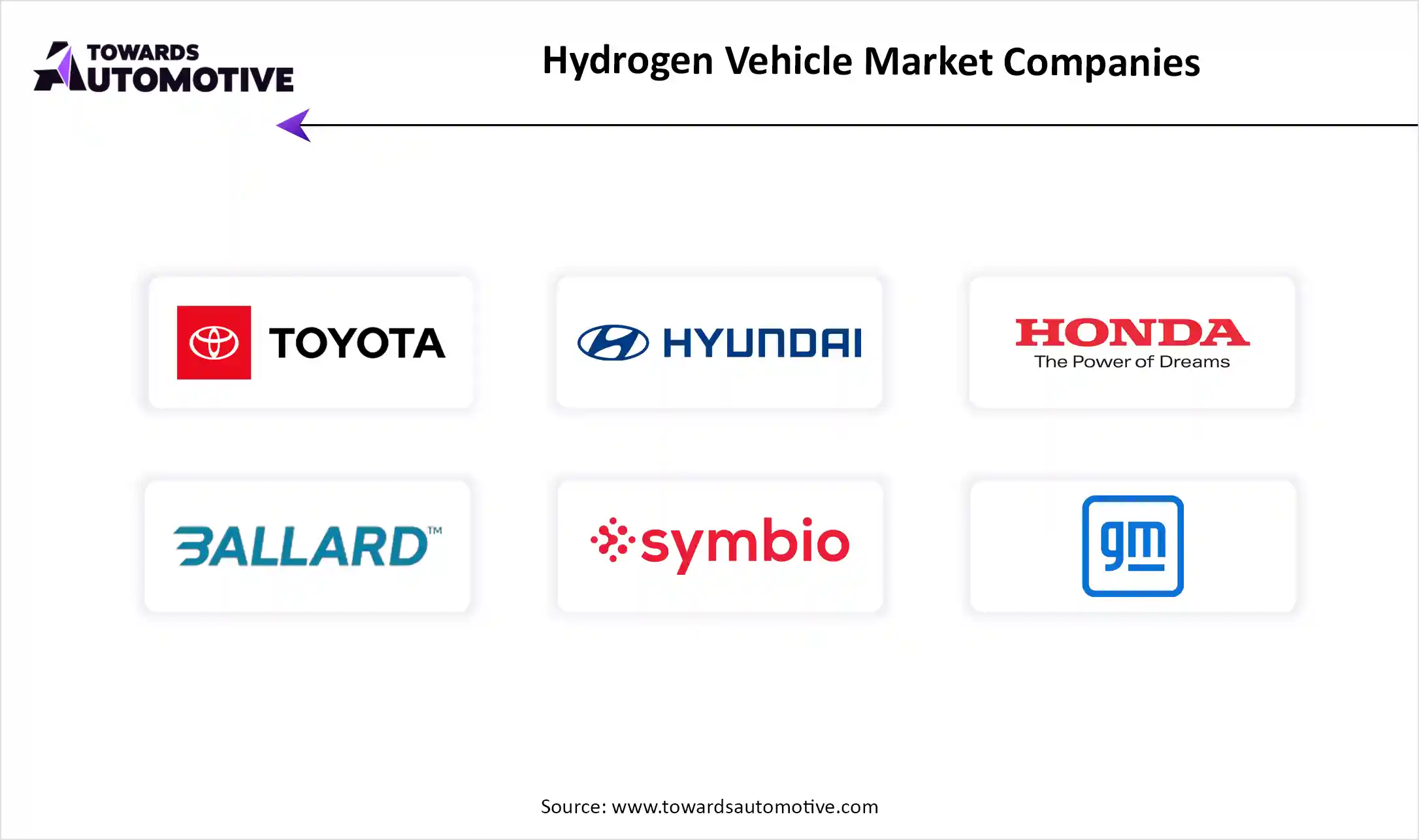
By Vehicle Type
By Powertrain Configuration
By Vehicle Class
By Geography
April 2025
April 2025
April 2025
April 2025
Dr. Arjun Patel is a distinguished expert in the automotive industry, holding advanced degrees in Automotive Engineering and Mechanical Engineering. His expertise spans automotive market dynamics, technological advancements, and sustainable practices. Dr. Patel excels in conducting in depth research and analysis on market trends, consumer preferences, and the economic implications within the automotive sector. He is renowned for his insightful publications on topics such as electric vehicles, autonomous driving technologies, and the evolution of sustainable transportation solutions. Dr. Patels research contributions have significantly advanced understanding in the field, earning him recognition as a leading authority in automotive research and analysis.
We offer automotive expertise for market projections and customizable research, adaptable to diverse strategic approaches.
Contact Us